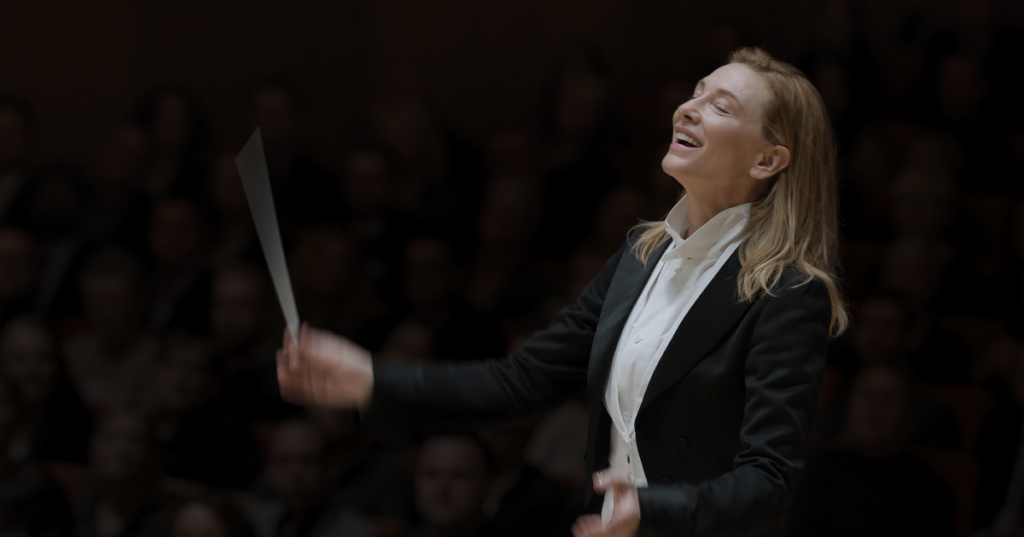When Lydia Tár gets on stage behind a podium and taps her baton, the audience is in complete silence, holding their breath in anticipation that something great is about to unfold. The same thing happens when Cate Blanchett graces the screen. She has brought to life countless great characters in her incredible career, but none have been as perfectly crafted as the one Todd Field wrote for her with Tár. Coming 16 years after Field’s previous movie, Tár is a breathtaking tribute to one of the great artists, putting Blanchett through a wringer and giving her an unprecedented opportunity to show everything she is capable of in one movie.
Tár is a character portrait of a great composer and conductor. Lydia Tár is so amazing that Field opens his film with her résumé and leads into a 20-minute interview sequence. We learn so much from this prologue, as Field economically gives us everything we need to know about Tár’s personality. He lays the foundation on which his drama will play out, similar to the slow burn of his only previous two films, In The Bedroom and Little Children. And the slow burn is slow, as the scandals that will ultimately lead to Tár’s downfall trickle out. The high points in her life are euphoric, but the lows come like crashing terrors in the night.
Videos by PopCulture.com

Those scandals are all of Tár’s own doing. Field and Blanchett have not created a character they want the audience to emulate. Tár imagines herself above everyone else in the world, casually dismissing people she uses as “robots.” She can only perceive life as a series of exchanges to pursue her artistic goals. When a student she rejected takes her own life, Tár doesn’t care to learn what led to the tragedy and instead does whatever she can to hide it. Tár puts herself into what she perceives as an impenetrable box, and her only reaction to any scandal is to preserve that by running from problems. She never wants to learn from her mistakes, even if that means isolating herself.
Blanchett transforms during the course of the movie. It’s hard to believe that Tár is played by the same person at the beginning, where she oozes with charm, and towards the end when she can barely hold it together. It’s also a subtle nod to celebrity, and how exhausting it can be to keep up a façade of perfection at all times. At some point, Tár performs in front of everyone. Even when she is at home with her wife, Sharon Goodnow (Nina Hoss), it’s all an act. Sharon bluntly tells Tár that the only person in her life she doesn’t expect a transaction from is their daughter, Petra (Mila Bogojevic). That’s almost true. Another person she doesn’t want anything from is her brother because Tár has completely rejected the idea of a “normal” life without globetrotting and being constantly praised.
Unlike In the Bedroom and Little Children, Tár is not an ensemble piece, since Blanchett’s character has very little room in her life to allow anyone else in. However, there are still several great supporting turns. Nina Hoss is perfect at doing so much without saying anything, as her reactions to Tár’s wildest antics provide a few light moments. Noémie Merlant acts as a sort of stand-in for the audience as Tár’s assistant Francesca Lentini, who begins to see the flaws in her idol just as we do. The great Julian Glover, known to many for his roles in Indiana Jones and the Last Crusade and For Your Eyes Only, gets a memorable part as Tár’s mentor, Andris Davis. But Tár can’t even consider Andris her equal.
Field’s directing is also inspiring. He structures the film as a series of long scenes, although the movie gets a bit more frantic as Tár falls apart. Florian Hoffmeister’s camera work flips easily from getting us inside Tár’s mind when Field needs us to, and also puts us at a distance to highlight her isolation. Hildur Guðnadóttir also provides an evocative original score, although most of it was not used and will be heard in an upcoming concept album.
Tár is a well-rounded and detailed portrait of an artist in a state of complete crisis. It shows why so many are unable to face scandal, but would rather go to lengths to bury them even if the end result leads to more destruction of a career. There are story threads in Tár that never get tied up, but that’s because these scandals never are in real life. The combination of Blanchett’s performance and Field’s directing results in an exhilarating epic in which a terrible person touched by genius can’t stop falling into an abyss.








